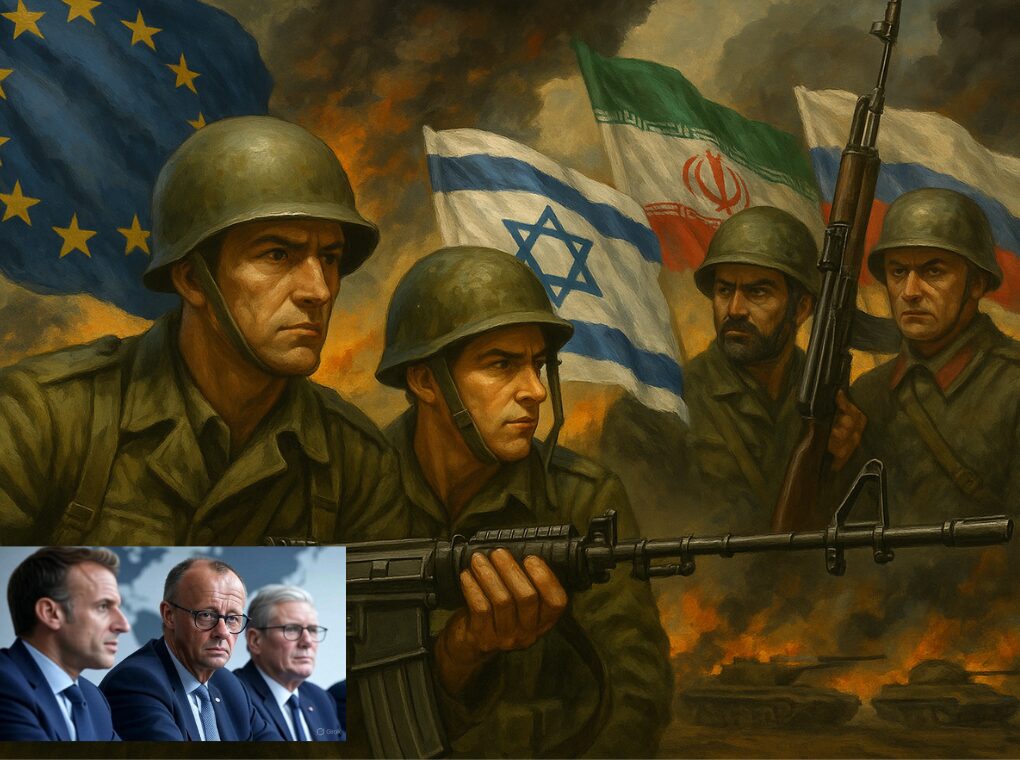German Chancellor Friedrich Merz’s recent statement that Israel is doing the “dirty work for all of us” in countering Iran’s regime underscores a pivotal shift in European rhetoric and policy toward the Israel-Iran conflict. This sentiment, echoed by France and the United Kingdom, reflects a complex interplay of geopolitical strategies, shared security concerns, and pragmatic calculations. While Europe has been vocal in criticizing Israel’s actions in Gaza, its support for Israel’s strikes on Iran—particularly in the context of Operation Rising Lion—reveals a deeper alignment driven by mutual interests and the broader geopolitical game.
This piece of opinion explores the reasons behind Europe’s backing of Israel and the strategic dynamics at play.
Shared Threat Perception: Iran as a Regional and Global Menace
Europe’s support for Israel’s actions against Iran stems from a shared perception of the Islamic Republic as a destabilizing force. Chancellor Merz’s reference to the “mullah regime” bringing “death and destruction” globally highlights Iran’s role in sponsoring groups like Hezbollah and Hamas, which have targeted Western interests and allies.
The October 7, 2023, Hamas attack on Israel, killing approximately 1,200 people and abducting 251, was a stark reminder of Iran’s influence through its proxies. Hezbollah’s attacks on Israel and its history of operations on European soil—such as the 2012 Burgas bus bombing in Bulgaria—further cement Iran’s image as a direct threat.
Merz’s comments, made on June 17, 2025, at the G7 summit, also point to Iran’s nuclear ambitions as a critical concern. The International Atomic Energy Agency’s reports, backed by Germany, France, and the UK, confirm Iran’s failure to comply with nuclear disclosure obligations, raising fears of a nuclear breakout. Israel’s strikes on facilities like Natanz, as part of Operation Rising Lion, align with European anxieties about a nuclear-armed Iran, which could destabilize the Middle East and threaten global security. For Europe, Israel’s actions serve as a frontline defense against this existential risk, sparing Western nations the direct military burden.
Geopolitical Alignment and Russia’s Shadow
Iran’s growing alliance with Russia, particularly its supply of drones for the Ukraine war, has heightened European support for Israel. Germany, France, and the UK, as key NATO members, view Iran’s partnership with Moscow as a direct challenge to European security. European powers “don’t complain about the taming” of Iran due to its Russian ties, reflecting a pragmatic stance: Israel’s strikes weaken a mutual adversary.
Israel ‘Operation Rising Lion’ means “Regime Change” in Iran
This alignment is not merely reactive. By supporting Israel, Europe signals its commitment to countering the Russia-Iran axis, which also extends to Iran’s support for Syria’s Assad regime and its influence in Iraq. For Germany, this stance dovetails with its hawkish approach to Iran, including plans to designate the Islamic Revolutionary Guards Corps as a terrorist organization within the EU.
Domestic and Historical Contexts: Germany’s Unique Position
Germany’s backing of Israel is deeply rooted in its historical responsibility for the Holocaust, often framed as “Staatsräson” or reason of state. Chancellor Merz, despite his sharp criticism of Israel’s Gaza operations, reaffirmed this commitment, stating on June 14, 2025, that Israel’s security is integral to Germany’s identity. This historical lens shapes Germany’s reluctance to fully break with Israel, even as public opinion—60% of Germans oppose weapons exports to Israel—pushes for a harder line on Gaza.
Merz’s balancing act is evident: he criticizes Israel’s Gaza campaign as “no longer justified” but praises its Iran strikes as serving a global good. This duality allows Germany to maintain its moral and historical obligations to Israel while addressing domestic and European pressure to uphold humanitarian law. France and the UK, less bound by such historical imperatives, share similar concerns about Iran but face domestic constituencies critical of Israel’s broader actions, necessitating a nuanced stance.
The Geopolitical Game: Power and Influence
Europe’s support for Israel against Iran is also a calculated move in the broader geopolitical chessboard. By endorsing Israel’s strikes, European powers gain leverage in Middle Eastern affairs without direct military involvement. The EU, UK, France, and Germany have historically offered diplomatic support for negotiations with Iran, but Israel’s actions provide a military complement to their strategy, pressuring Tehran to return to the negotiating table. Merz’s warning that Iran’s nuclear program could face “total destruction” if it refuses diplomacy underscores this approach, with the US as a potential enforcer.
Moreover, supporting Israel allows Europe to align with the United States, particularly under President Donald Trump, who has signaled a hardline stance against Iran. While European leaders like UK Prime Minister Keir Starmer have downplayed direct US military involvement, Merz’s comments suggest openness to American participation, reflecting a desire to maintain transatlantic unity.
Pragmatism Over Principle
Europe’s support for Israel against Iran is driven by a convergence of security interests, historical obligations, and geopolitical pragmatism. While Germany, France, and the UK criticize Israel’s Gaza operations, their backing of Operation Rising Lion reflects a strategic calculus: Israel’s actions counter a shared threat, weaken a Russian ally, and maintain Western influence in the Middle East. This duality—condemning Gaza’s humanitarian toll while endorsing Iran’s taming—reveals the delicate balance European leaders navigate. As the Israel-Iran conflict evolves, Europe’s role will likely remain one of calculated support, prioritizing stability and influence over ideological purity.
